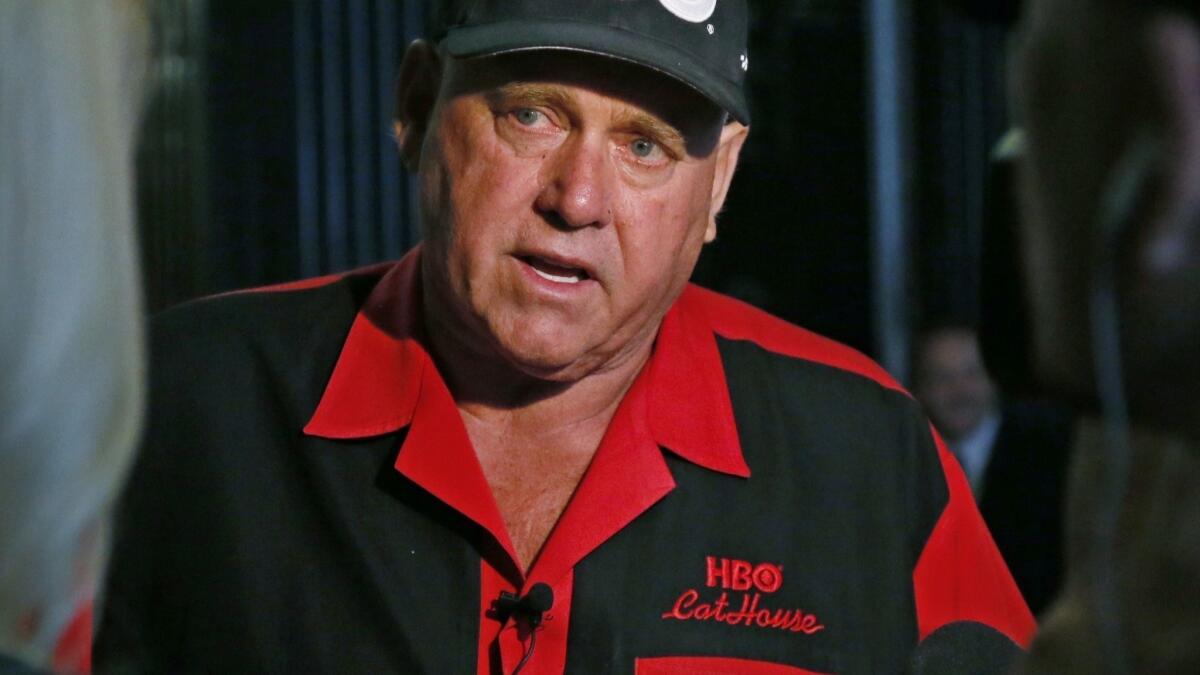Op-Ed: Will Nevada ban brothels or elect a pimp to the state Assembly?

- Share via
Nevada is the only state in the country where any kind of prostitution is legal, and it has held this distinction since 1971. That’s when the state passed a bill allowing counties with fewer than 700,000 residents to operate legal brothels. There are currently about 20 licensed brothels spread across seven counties.
In practice, though, the lines between legal and illegal aspects of the sex trade are often blurred in Nevada. Many of the laws governing prostitution are seldom enforced. And while buying sex is illegal in the larger cities of Reno and Las Vegas, that doesn’t stop the latter from promoting prostitution with slogans such as “what happens in Vegas stays in Vegas.”
But Nevada may soon be facing a fork in the road. This November, residents of Lyon County will vote on whether to close the legal brothels in their area. Many activists and some state legislators are hoping that the ballot initiative in Lyon County will start a broader push to shut down brothels across the state.
In the same election, one of the most notorious pimps in Nevada, Dennis Hof, is running as the Republican candidate for state Legislature. If he wins, Hof, who owns half a dozen legal brothels and once starred in a reality TV show called “Cathouse,” will almost certainly try to legalize prostitution throughout the state.
In country after country that has tried it, legalized prostitution has led to an increase in demand, which in turn has led to a rise in sex trafficking.
Many argue that full decriminalization of the sex trade makes it safer, but this is not borne out by the facts. Full criminalization of the trade is no better. Nevadans who support women’s equality should opt for a third approach: a system of partial decriminalization known as the Swedish model.
The Swedish model, also known as the Nordic model and the equality model, criminalizes the buying of sex but not the individuals who are sold for sex. The system prevents the arrest of women in the sex trade while maintaining penalties for the buyers, brothel owners and pimps who fuel the market.
First introduced in Sweden in 1999, the model works because it acknowledges the fundamental power imbalance at the heart of the sex trade. Most women who work in the global sex trade enter prostitution as minors, at an average age of 13 to 14 years old. Many are coerced into the trade through violence and often as a result of poverty and desperation.
Police in Sweden have reported that, since the country’s pioneering laws went into effect, prostitution has decreased by two-thirds. According to a 2010 government report, the partial decriminalization approach enjoys broad popular support in Sweden, with a majority of both women and men favoring it.
The model has spread to Norway, Iceland, Canada, Northern Ireland, France and the Republic of Ireland. All of these countries have seen a reduction in both prostitution and sex trafficking.
Full legalization or decriminalization of the sex trade has not yielded such results. In country after country that has tried it, legalized prostitution has led to an increase in demand, which in turn has led to a rise in sex trafficking. In many instances, the already extreme level of violence toward girls and women who work in the sex trade also grows, and does so under a cloak of legitimacy.
Enter the Fray: First takes on the news of the minute from L.A. Times Opinion »
The Netherlands was the first country to completely legalize prostitution, in 2000. The government argued that full decriminalization would make the sex trade safer and end sex trafficking. Neither happened, and the experiment is widely regarded as a disaster. Amsterdam has since closed down many of its brothels.
New Zealand decriminalized its sex trade in 2003. Several years later, former Prime Minister John Key said that the policy had done nothing to reduce sex trafficking and that violence against women in prostitution had continued.
Britain’s first legal red light district, in Leeds, has also been pronounced a failure and may soon be shut down.
Policymakers around the world are recognizing that it is simply not possible to regulate an industry that is built on profound exploitation. Nevada should make use of this growing evidence and penalize those who exploit people in the sex trade, not those who are exploited.
Jessica Neuwirth is the founder of Donor Direct Action, an international organization that works to end sex trafficking around the world.
Follow the Opinion section on Twitter @latimesopinion or Facebook
More to Read
A cure for the common opinion
Get thought-provoking perspectives with our weekly newsletter.
You may occasionally receive promotional content from the Los Angeles Times.









